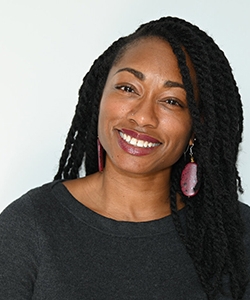Privately-owned affordable housing should be a launching pad for families to build assets and reach their financial goals. HUD’s FSS program is a promising pathway to make this the norm.
After her son was born prematurely, Laura Rosa learned about the Family Self-Sufficiency (FSS) program through her housing provider. She was looking for ways to rebuild herself mentally and financially and dreamed of buying a home someday. Two years ago, Laura started working with her FSS financial coach to make a plan for homeownership, like budgeting and building her credit. And it’s working – her credit score is already up 100 points.
“My mom raised us in subsidized housing. Even though she’s been a federal employee for more than 20 years, we’re still here. It’s because she never had the opportunity to learn about credit building and budgeting. And the way subsidized housing calculates your rent really limits what you can do with your income. But I’m changing that now since I’ve joined FSS. I’m building savings and learning how to make my money work for me. I’m going to become a homeowner and give my kids something they can build upon, and a place for my mom to age in.”
We all need assets to invest in the future and move our families forward – whether it’s for education, homeownership, or starting a small business. For Laura and millions of families with low incomes in the US, the opportunity to build assets is out of reach. Oftentimes, financial assistance programs address a family’s immediate needs, but do not help the family build assets. In fact, many anti-poverty programs discourage or penalize savings, adding to systemic and historic barriers to wealth building for Black and/or Latina women and contributes to the growing racial and gender wealth gaps.
However, there’s a widely underutilized federal program with tremendous potential to change this dynamic for families with low incomes – HUD’s Family Self Sufficiency (FSS) program.
Congress created the FSS program in 1990 to help families who live in public housing or receive HUD-based housing vouchers to increase their income and build savings. FSS is a savings incentive program that enables participants to save a portion of their rent payment when their incomes increase through work.
Importantly, FSS resolves a well-documented issue in how rent is calculated in subsidized housing. Typically, when a resident increases their earnings, their rent increases and they may also become ineligible for other benefits. This makes is next to impossible to build any real savings or assets. With FSS, households can save those rental payments. These savings build over time and participants can use the savings toward their financial goals such as buying a home, going to college, or improving their credit. Program graduates save an average of more than $8,000 in addition to other benefits over five years.
Veronica, a POAH resident in Rhode Island was able to save over $12,800 in her first five years in the program, all while going back to school to further her career. She shares, "When I look back on the last five years, I feel great pride at all that I’ve accomplished. I am stronger physically, emotionally, and financially. I feel comfortable in my own skin, and I never would have said that before. I think it’s been great for my daughter to see this too. It’s helped her feel encouraged to go to college and chase her dreams. Now she knows anything is possible."
FSS stands out among asset-building programs because the savings component is built into and funded by HUD, making it highly scalable. Despite its potential, FSS is largely underutilized. An estimated 2.2 million US households are eligible for the program, yet less than 65,000 are currently enrolled. In other words, there is a large, untapped pool of federal funds that could help close the asset gap for lower-income Americans.
Compass Working Capital, a national nonprofit financial services organization, has delivered its unique model for FSS programs since 2010, supporting 4,400 families to build over $10 million in savings. The model combines the savings opportunity with individualized financial coaching to support participants to achieve their own financial goals. A 2021 study by Abt Associates of Compass FSS programs found that participants earned more and received less public assistance than their matched peers.
In 2014, Congress made private owners of affordable housing with Project-Based Rental Assistance contracts eligible to offer FSS to their residents. Compass and the Preservation of Affordable Housing (POAH) partnered to launch some of the first FSS programs in the country under this new eligibility, extending Compass’ model to many of POAH’s residents. A 2021 study by Abt Associates found promising early indications that Compass achieves the same outcomes for POAH’s FSS participants as with public housing authorities.
“After seeing the tremendous opportunity this program gave to families living in public housing,” says POAH CEO, Aaron Gornstein “We were determined to make sure families who live in private multifamily housing, like POAH’s, had that same opportunity to build savings, work towards their personal and financial goals, and realize their dreams.” Since the program launched in 2015, POAH residents have saved more than $1.5 million.
Given the promising results of this partnership to date, Compass and POAH are pursuing a shared vision to make the program available across POAH’s full FSS-eligible housing portfolio. Together with a coalition of partners, we’ve also worked to expand federal support for the program and create conditions for more multifamily owners to take advantage of this opportunity for their residents.
Compass has also worked in multiple ways to support more multifamily owners to launch FSS programs for their residents – through direct partnerships, training and technical assistance, and our online learning community called Compass FSS Link.
The Wells Fargo Foundation has supported Compass and POAH to expand the scope and impact of FSS in multifamily properties, including $500,000 in grant funding to Compass in 2021 and local support for POAH’s FSS program in Washington, DC.
“The FSS program has proven to be life changing for thousands of low-income renters – helping them build financial capability and assets through savings, improve their credit, and make progress towards financial independence,” said Bonnie Wallace, head of Financial Health Philanthropy and at Wells Fargo. “Through our work with Compass and housing providers, we hope to make it easier for people to learn about and access the FSS program so that more people can achieve housing stability and economic mobility.”
On September 20 our three organizations will present at the Prosperity Summit, hosted by Prosperity Now in Atlanta, on the opportunity we all see in FSS, resources to help multifamily owners launch an FSS program, and our vision for the future. We look forward to joining our peers in the asset-building field as we work toward a day in which the opportunity for families with low incomes to build assets is the norm, and not the exception.



